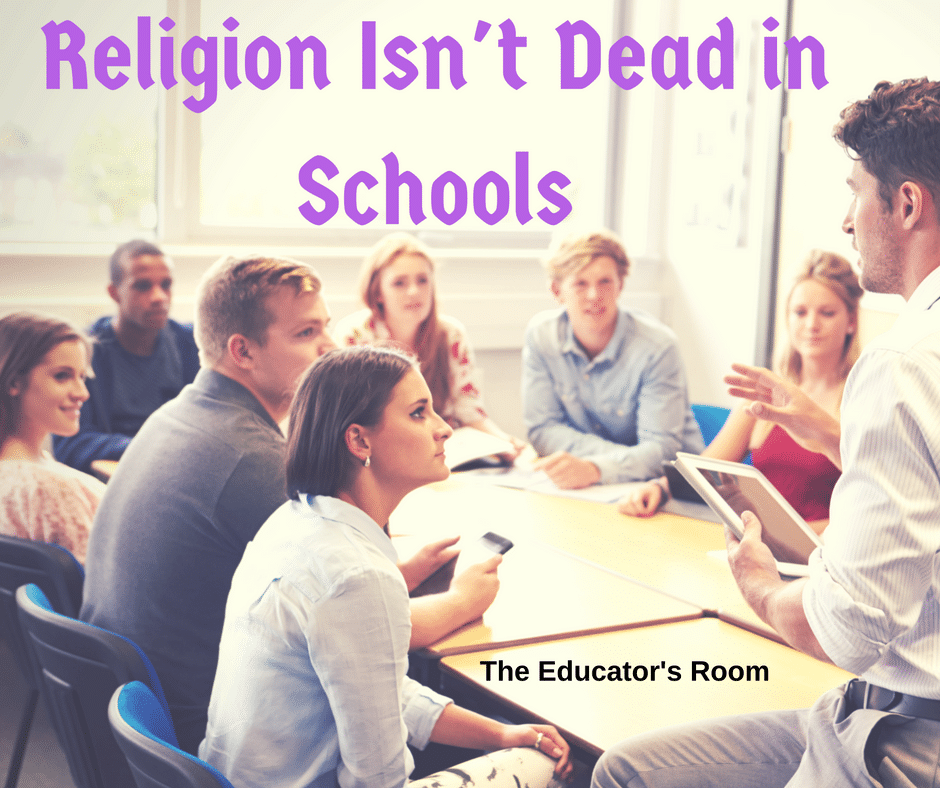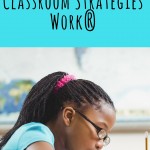From time to time, I receive an email from a parent asking “how do you go about teaching religion?” They are afraid that learning about other religions or even Greek mythology will taint the family beliefs that they and/or their institution have taught.
As a public school teacher, there’s really one answer – “I don’t teach religion.” But that doesn’t mean we stop teaching about religion. Nor do educators seek to make children irreligious.
Let’s examine how religion has been and can be embraced in schools.
School-wide
Once in a while, outside groups organize “Meet You at the Pole” to share prayer and scripture. I’ve attended a few of these, not as a teacher, but as an American worshiper. The Supreme Court has protected the rights of all students to organize and discuss their religion.
At the start of every school day, most schools begin with either “The Star-Spangled Banner” or, more commonly, The Pledge of Allegiance.
Since we begin our day with this simple and important recitation, it’s important to discuss how the words “under God” appear in the Pledge of Allegiance. In our social studies curriculum, we explore why we tapped American Judeo-Christian beliefs in 1954 by adding “under God” in the midst of our Cold War struggle with the communist (and non-religious / atheistic) U.S.S.R.
[fusion_builder_container hundred_percent=”yes” overflow=”visible”][fusion_builder_row][fusion_builder_column type=”1_1″ background_position=”left top” background_color=”” border_size=”” border_color=”” border_style=”solid” spacing=”yes” background_image=”” background_repeat=”no-repeat” padding=”” margin_top=”0px” margin_bottom=”0px” class=”” id=”” animation_type=”” animation_speed=”0.3″ animation_direction=”left” hide_on_mobile=”no” center_content=”no” min_height=”none”][bctt tweet=”bctt tweet=”It’s important to discuss how the words “under God” appear in the Pledge of Allegiance.” username=”EducatorsRoom”” username=”EducatorsRoom”]
I say “most schools recite” because I was unsuccessful in trying to locate what percentage of schools that do or don’t begin the day this way. While there are some schools that don’t recite either patriotic intonation, I’m comfortable guessing it’s around 80% or higher. Additionally, President Obama did not make reciting the Pledge illegal, no matter what your angry uncle declares at the Thanksgiving dinner table.
In class
Speaking of Thanksgiving, the Pilgrims were persecuted so frequently, each time they thought they found a new home, they were not abused and mistreated. In turn, they aimed their rental ship Mayflower for Virginia. Though they missed, they praised God for reaching a new land that was cleared for them to succeed.
In my home state of Pennsylvania, I teach my students about Quaker beliefs because that’s how and why we were founded. Indeed the Society of Friends (as they’re officially called) have and still believe that all people are equal and should be treated that way, which led to contention in the Old World – they would not bow to or serve a king – and a model for the New World – indeed, Penn paid the native Lenni Lenape / Delaware peoples for their land, and, later the Quakers would be at the forefront of the abolitionist movement.
There are many stories of this nature in my 7th grade early American history class, and we’d neglect a healthy part of our history if we ignored how religion played a role in our republic.
[bctt tweet=”We’d neglect a healthy part of our history if we ignored how religion played a role in our republic” username=”EducatorsRoom”]
But the stories hardly stop in middle school. Or in American history.
When I taught other levels at the high school, we spent a healthy part of our time learning about and discussing the beliefs of other religions, too. We learned what made Russian Orthodox different from other sects of Christianity. We learned about Islam and Judaism, connecting their similarities and noting their differences. We read the Buddha’s teachings. We discussed the impact of Hindu holidays. We compared and contrasted the spiritualism of Asian Taoism and American Indian worship. We dove into the smaller religions of Zoroastrianism, Sikhism, Tenriism, and more. Linda K. Wertheimer recently wrote an article for Time Magazine on “How to Teach World Religions in Schools;” I recommend it to any educator who worries that their learning about education could be misconstrued as attempted indoctrination.
Which leads me to note – at no point did a student convert religions – or even entertain the idea. Instead, they were fascinated learning about them.
Nor did students convert to Christianity when my friend and our school’s choir director sang Gospel hymns at last year’s Winter Gala.
Additionally, our school – and many others – has a Bible literature class. And why not? For as often as the Bible is referenced throughout history, in quotes, in common sayings, proverbs, and thoughts, it’d be beyond foolish to disregard the Bible and not teach students about its impact.
For students
While teachers – as employees of the state – have no right to proclaim Jesus the Messiah just as they have no right to declare Satanism or Pastafarianism as the true and right way, students do. That’s because we have a captive audience; they do not. So, if a student wants to:
- Pray before their test, they can do that.
- Pray with a group, they can do that. (Must be a really hard test!)
- Read Gospel during their valedictorian’s address, they can do that.
- Share verses of the Koran with their classmates, they can do that.
- Organize a religious vigil for Black Lives Matter or Blue Lives Matter, they can do that.
- Sit during The Pledge of Allegiance because they’re atheist and don’t want to say “under God,” they can do that.
- Take off school for Yom Kippur and other Jewish High Holidays, they can do that.
- Dress-up for Holi or other Hindu holidays, they can do that.
- Wear their turban, yarmulke, or hijab to cover their head, they can do that. (Note: click here to learn the difference between a hijab and other head coverings)
- Wear a shirt saying “Jesus is my Savior,” they can do that. They can alternately wear a shirt that is sarcastic about Jesus.
- Create their own religion during lunch, they can do that.
- Declare they believe in creationism instead of evolution, they can do that.
- Write an essay on why abortion or the death penalty violates their religious beliefs, they can do that.
What students (and schools) can’t do is violate the Lemon Test of the Constitution’s “Establishment Clause,” which involves asking:
- Does the activity have a secular purpose?
- Does it advance – or inhibit – religion?
- Does it cause entanglement in religion?
That’s in addition to noting that religions freedom shouldn’t be at the expense of security and safety, as well as ensuring that one’s religious freedom does not persecute students in ways similar to those that caused the Pilgrims to find Plymouth nearly 400 years ago.
Conclusion
Religion in schools is a very large issue, but hardly one we need to shy away from. Just like anything, more education brings more light to the issue, and discussing religion is not something that should be avoided. Instead, religious discussion should be revived, kindled, and stoked for all students.
[bctt tweet=”Religious discussion should be revived, kindled, and stoked for all #students. Not avoided. #edchat” username=”@MrJakeMiller”]
Otherwise, their parents won’t know what we’re doing in class, and they’ll resort to asking you – or worse yet, make assumptions about it, instead.
Post-Script
Additionally, I invite you to read the following pieces, each just as excellent as the next:
- Werkheimer in The Washington Post: “Public schools shouldn’t preach; but they should teach students about religion”
- The First Amendment Center “A Teacher’s Guide to Religion in Public Schools”
- American Civil Liberty’s Union: “Religion in Public Schools”
 [/fusion_builder_column][/fusion_builder_row][/fusion_builder_container]
[/fusion_builder_column][/fusion_builder_row][/fusion_builder_container]







“Once in a while, outside groups organize “Meet You at the Pole” to share prayer and scripture. I’ve attended a few of these, not as a teacher, but as an American worshiper.”
Making up your own legal standards won’t kold up in court. There is precedent.
***
Third, Marlowe, Adamson, and other Lakeview teachers participated in the events. Marlowe and Adamson claimed that they attended in part to supervise students. See Bd. of Educ. v. Mergens, 496 U.S. 226, 253, 110 S.Ct. 2356, 110 L.Ed.2d 191 (1990) (the Equal Access Act permits assignment of a teacher, administrator or other school employee to a meeting for custodial purposes and such custodial oversight of a student-initiated religious group, merely to ensure order and good behavior, does not impermissibly entangle government in day-to-day surveillance or administration of religious activities). They did not speak or lead the group in prayers, but like other participants, they bowed their heads when prayers were offered and wore “I Prayed” stickers during instructional time following the National Day of Prayer. The young students and their parents understandably could have thought that the teachers and school principal were present as representatives of the school and as such their actions were an `endorsement of the religious event. Their actions crossed the line of permissible supervision of the students at the event… (http://www.leagle.com/decision/20081330564FSupp2d766_11251/DOE%20v.%20WILSON%20COUNTY%20SCHOOL%20SYSTEM)
I suggest you reassess your role at such events, as your explicit admission above can be used as evidence of impropriety. I will forward the URL for this page, along with a screenshot of the admission and the time it was accessed, to the appropriate parties and, should someone from your school file a complaint, that evidence will be on record.
Thanks for sharing!
Randy,
Your entire argument is flawed and doesn’t even address the point of this article. Instead of coming online and threatening a teacher, why don’t we take your IP and report you to the authorities?
Randy, thank you for not reading my anything beyond the first part of my article. I invite you to contact my administrators and/or the authorities so you may “tell on me.” When you do, be sure to remind them that I attended a different student’s bar mitzvah, another’s Holi celebration, another’s mosque, and defended another’s right to make a religious objection at the school where I teach. Your comments also help support my thoughts on my First Amendment article (http://theeducatorsroom.com/2016/09/first-amendment-rights/), which you may or may not also have read in its entirety. Thanks again for your patronage of The Educator’s Room!
What a great clarification article!
Thank you for creating and sharing!